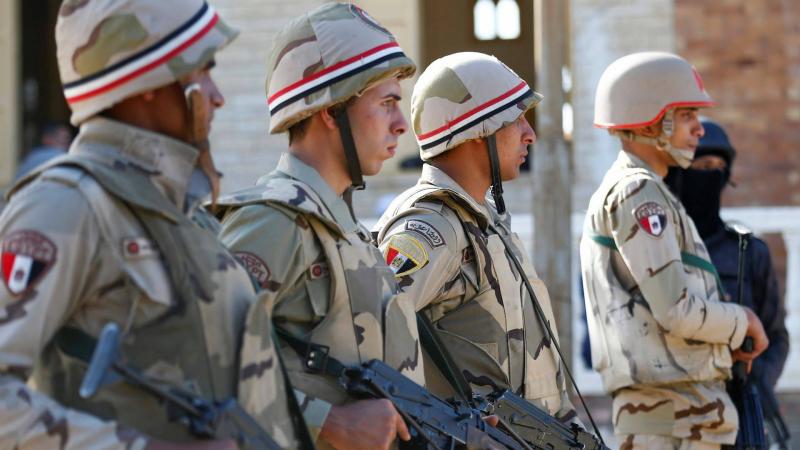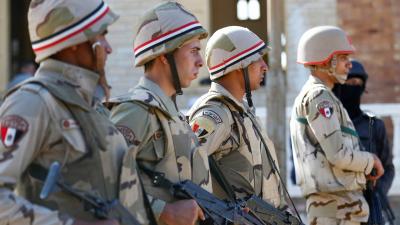On the Sinai Peninsula in northeastern Egypt, on the evening of January 16, 2024, a group of armed individuals moved with 174 kilograms of drugs toward the border with Israel, specifically the al-Awja crossing, known in Israel as Nitzana, which is about 40 kilometers from the Rafah crossing. The goal of this armed group was to smuggle drugs from Egypt into Israel, according to the Egyptian account of the incident, which added that there was an exchange of gunfire, resulting in the Egyptian army arresting six smugglers and one person being killed, though the army did not specify whether the deceased was a smuggler or one of its personnel.
The Israeli military narrative was quite similar, stating that 20 individuals from Egyptian territory approached the border area near the Nitzana crossing late on Monday night, some of whom were armed. Israeli soldiers fired at them, causing injuries. According to Israeli army radio, an Israeli female soldier was injured during this operation, "which is likely an attempt to smuggle drugs."
However, some social media users questioned both the Egyptian and Israeli narratives, drawing comparisons to an incident involving Egyptian conscript Mohamed Salah last year, when he crossed the border fence into Israel and killed three Israeli soldiers. At that time, the Egyptian army stated that what happened was a pursuit of drug smuggling elements, which conflicted with the Israeli narrative that referred to it as an operation by an Egyptian security personnel against its soldiers.
Despite some celebratory remarks on social media regarding the incident on Monday, linking it to the current situation in Gaza, indications from Egyptian analysts suggest that this was indeed one of the recurring drug smuggling operations between Egypt and Israel.
The Sinai Peninsula covers an area of 61,000 square kilometers, most of which consists of harsh deserts with varied terrain, including plains in the north, a plateau region, and another mountainous region. Estimates indicate that less than 10 percent of the area has been developed for agriculture and habitation.
"For this reason, cannabis farms and especially 'bango' (a type of cannabis) are widespread in the Sinai deserts, as the region is vast and does not require much water for drug cultivation, and it is a lucrative trade, especially when selling drugs in Israel," according to Major Samir Ragab, the Egyptian military expert and head of the Arab Center for Strategic Studies. Ragab further explained to the BBC that a significant part of the desert area in northern Sinai, extending from the east of the Suez Canal to the border with Israel, is unsuitable for agricultural activities and lacks sufficient water, which is why drug cultivation thrives in these areas.
"Despite the Egyptian army conducting extensive campaigns against these farms, they have not eradicated them completely, as the farms exist on mountain slopes or in deep valleys, making complete removal difficult," Ragab notes.
He believes that drug dealers in Sinai prefer to sell their products to the Israeli side, as this option is considered "safer" for them, adding, "Selling it in Egypt means they must pass through an endless number of checkpoints, both before and after crossing from the Suez Canal area, while on the Israeli side, we are talking about about 245 kilometers, which is the length of the border fence between Egypt and Israel. Moreover, any drug smuggler in Egypt must have someone on the Israeli side to receive the drugs."
Regarding the Israeli side, the Israeli army announced in February of last year that it had thwarted an attempt to smuggle drugs worth $13 million from Egypt, seizing a vehicle near the border driven by a Bedouin Israeli carrying 120 kilograms of hashish, heroin, and cocaine. The Israeli army indicates that drug smuggling operations peaked across the border with Egypt in 2019, recording 726 smuggling attempts, but began to decline during 2020 and 2021 before rising again in 2022, with 575 drug smuggling attempts recorded that year.
Former Israeli army colonel Grisha Yakubovitch explains that the reason for this is that "smuggling operations have become more complex across the border between Egypt and Israel." He notes that the border between the two countries stretches for dozens of kilometers, and smugglers study the weaknesses of both the Egyptian and Israeli armies, the routines of the soldiers, and the best areas for smuggling. He adds that on the Israeli side, there are Israeli citizens who receive drugs from Egyptian smugglers and then sell them in the Israeli market.
Yakubovitch believes that despite Israel building a wall along the border with Egypt, smuggling operations continue. He states, "The army can thwart these operations as much as possible, but it cannot completely eliminate them, just like drug smuggling between Jordan and Israel or between the United States and Mexico."




